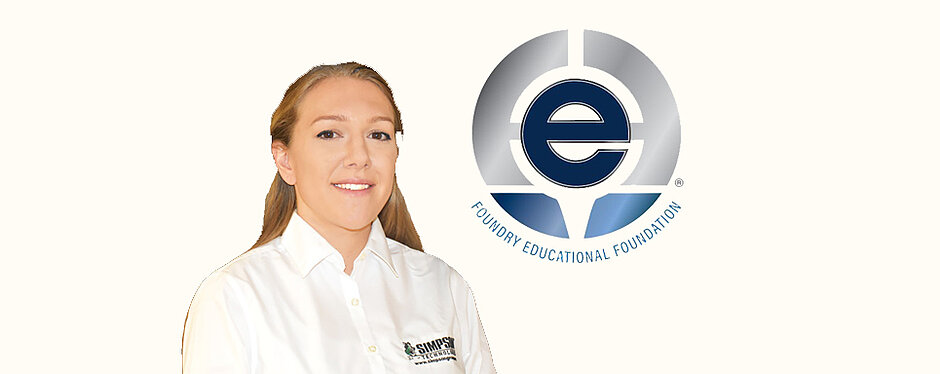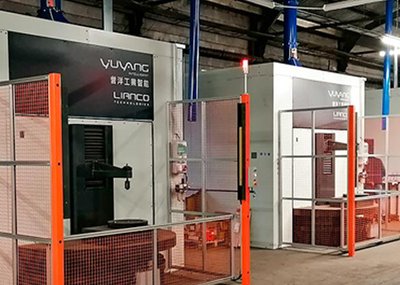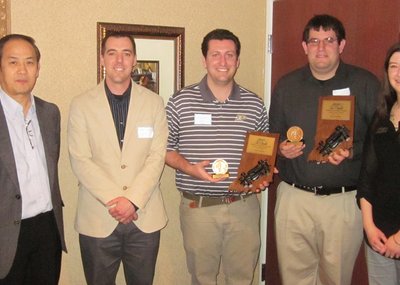On her first day of class at the University of Alabama at Birmingham, Shedlarski was given the choice of either writing a paper or working in the foundry as punishment for disrupting class. Although she didn’t know what a foundry was, Emily quickly fell in love with it, especially after seeing her first metal pour. She went on to graduate from the University of Alabama at Birmingham, with a degree in Materials Engineering and later, a Masters in Information Engineering Management.
Emily’s involvement with FEF started during her sophomore year, thanks to FEF Key Professor Charlie Monroe. She went on to participate in casting competitions, toured foundries and steel mills. Needing to pay her living expenses, Emily started working at steel mills in Birmingham, while also working on the on-campus foundry with Dr. Robin Foley. Emily received several FEF scholarships that helped her pay for summer classes. After attending an FEF College Industry Conference (CIC) in 2013, she knew that she couldn’t see herself working in the steel industry anymore. Emily commented, “FEF activities really helped me develop a strong baseline, so when I started to look for a job in the competitive market it was easy for me to get my first job as a foundry manufacturing engineer.”
Shedlarski’s career in metal casting started with the help of Dr. Berry Andrews. He helped her find her first job at Nucor Steel in Birmingham, Alabama as a Metallurgical Engineer. She started in the melt department, working in the laboratory, then moved over to the QA lab. When moving to the company’s Memphis, Tennessee plant, Emily worked in claims with an SEM and destructive testing/analysis.
Upon graduation with her bachelors, she joined Hubbell Power Systems in Leeds, Alabama as a foundry Manufacturing Engineer. Working there for 3.5 years, she was the Project Manager for a multi-million dollar foundry replacement project. This project gave her the opportunity to expand her skill set, since she worked closely with the lawyers of the company to develop the quotation and legal contractual agreements between companies, international shipping, safety and corporate finances. She was also the Project Manager for smaller projects such as: rebuilding core machines, crucible furnaces and an antiqued sand/metallurgical lab.
Her next career move took her to Mueller Water Products in Chattanooga, Tennessee, where she worked as a Process Engineer. In her role, Emily worked with different departments to engineer solutions for production concerns and other objectives that were negatively impacting the process and the bottom line. While there, she was promoted to Project Engineer and she managed a metal recovery project that recovered over a million pounds of iron in 7 months. Another project, worth approximately one million dollars, involved Shedlarski replacing the furnace controls in a customer’s plant. Lastly, she acted as a technical liaison, going to different facilities to troubleshoot problems and managed cost savings projects to achieve corporate objectives.
In November of 2019, Emily presented at CIC, where the CEO of Simpson Technologies Corporation saw her and offered her a position as Regional Account Manager for the Southeast. The company is based in Aurora, Illinois and Shedlarski lives in Chattanooga, Tennessee. She does marketing, account management, makes sure the customers get the parts they need and helps them with updates to their machines. She’s also heavily involved in growing the customer base and increasing sales. In the next six months, Emily will make the transition to Product Manager. This means she will be responsible for all US customers, as well as international ones.
Besides being on the FEF board, Emily is a member of the Fund Enhancement Committee, helping to organize the FEF Fitness Challenge. The challenge involved FEF students, alumni and friends forming teams and raising funds by logging in miles. Prizes included cast iron skillets and socks. She is passionate about this, believing it is important to continue to fund FEF schools and help students who don’t have the financial means to complete their degree. Regarding student engagement, Emily is involved in student chapters and frequently drops by FEF schools. In addition, she gives presentations as requested by different schools.
When discussing student involvement with FEF, Shedlarski pointed out that FEF program accreditation carries a lot of weight in the industry and these programs supply students with basic skill sets that allow them to grow in their career. The biggest benefit Emily got from FEF was attending CIC because it changed her life. She credits it with students making friends with others who share their passion and becoming a big family. “They have the opportunity to see how invested the industry is in the future, which really is the students.” Furthermore, she mentioned the endless possibilities that metal casting offers people from various backgrounds. That’s why it’s imperative for students to become involved and meet people who are going to lead the industry.
Emily concluded, “Arguably, FEF has done more for me than I could ever imagine. Even to this day, I am so grateful for it because I have a job I love in an industry I’m passionate about and I’m surrounded now by lifelong friends.”






